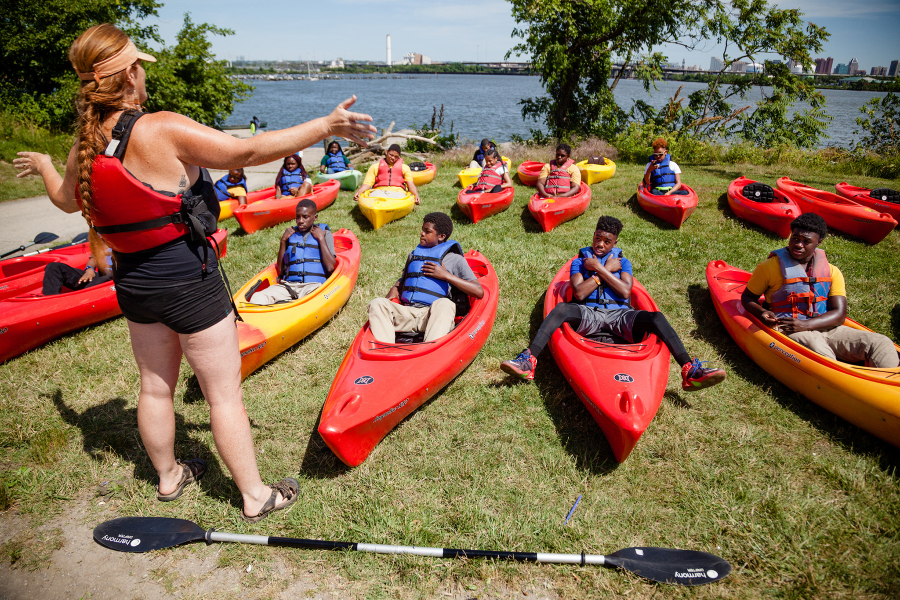Fostering Chesapeake Stewardship Goal Implementation Team (GIT 5)
Meetings
Workforce Meeting - February 2026
Stewardship Workgroup Meeting - March 2026
Workforce Meeting - April 2026
Public Access Workgroup Quarterly Meeting - February 2026
CANCELED - Protected Lands Workgroup Quarterly Meeting - January 2026
Stewardship Workgroup Meeting - December 2025
About
With over 17 million people living in the Chesapeake watershed, public participation is a vital piece of the restoration effort. The Fostering Chesapeake Stewardship Goal Implementation Team’s charge is to increase individual stewardship action, support environmental education for all ages, and assist individuals, communities and local governments in undertaking initiatives to conserve treasured landscapes. The team hopes to reconnect the public with nature and foster a shared ownership of the Chesapeake’s resources. This approach will build public support of restoration and conservation efforts and increase public engagement and active stewardship.

The Stewardship GIT pursues the 2014 Chesapeake Watershed Agreement goals and objectives to:
- Stewardship Goal: Increase the number and diversity of local stewards and local governments that actively support and carry out the conservation and restoration activities that achieve healthy local streams, rivers and a vibrant Chesapeake Bay.
- Stewardship Outcome: Increase the number and diversity of trained and mobilized volunteers with the knowledge and skills needed to enhance the health of their local watersheds.
- Public Access Goal: Expand public access to the Bay and its tributaries through existing and new local, state and federal parks, refuges, reserves, trails and partner sites.
- Public Access Site Development Outcome: By 2025, add 300 new public access sites, with a strong emphasis on providing opportunities for boating, swimming and fishing, where feasible.
- Environmental Literacy Goal: Enable students in the region to graduate with the knowledge and skills to act responsibly to protect and restore their local watershed.
- Student Outcome: Continually increase students’ age-appropriate understanding of the watershed through participation in teacher-supported, meaningful watershed educational experiences and rigorous, inquiry-based instruction, with a target of at least one meaningful watershed educational experience in elementary, middle and high school depending on available resources.
- Sustainable Schools Outcome: Continually increase the number of schools in the region that reduce the impact of their buildings and grounds on their local watershed, environment and human health through best practices, including student-led protection and restoration projects.
- Environmental Literacy Planning Outcome: Each participating Bay jurisdiction should develop a comprehensive and systemic approach to environmental literacy for all students in the region that includes policies, practices and voluntary metrics that support the environmental literacy Goals and Outcomes of this Agreement.
- Land Conservation Goal: Conserve landscapes treasured by citizens in order to maintain water quality and habitat; sustain working forests, farms and maritime communities; and conserve lands of cultural, indigenous and community value.
- Protected Lands Outcome: By 2025, protect an additional two million acres of lands throughout the watershed—currently identified as high-conservation priorities at the federal, state or local level—including 225,000 acres of wetlands and 695,000 acres of forest land of highest value for maintaining water quality.
Publications
Chesapeake Bay Region 2024 Environmental Literacy Report
Publication date:This report presents watershed-wide results from the 2024 Environmental Literacy Indicator Tool.
View document [PDF, 6.4 MB] Chesapeake Bay Region 2024 Environmental Literacy Report
2022 Stewardship Outcome Narrative Analysis
Publication date:This document was presented to the Management Board as part of the 2019-2021 Strategy Review System cycle.
View document [PDF, 440.6 KB] 2022 Stewardship Outcome Narrative Analysis
2022 Stewardship Outcome Pre-Quarterly Progress Meeting Logic & Action Plan
Publication date:This work plan was developed as part of the 2019-2021 Strategy Review System cycle.
Call for Stewardship Co-Chair
Publication date:The Chesapeake Bay Program's Stewardship Workgroup seeks a chair.
Chesapeake Bay Region 2019 Environmental Literacy Report
Publication date:This report presents watershed-wide results from the 2019 Environmental Literacy Indicator Tool.
View document [PDF, 357.6 KB] Chesapeake Bay Region 2019 Environmental Literacy Report
Our Watershed Agreement Goals & Outcomes
Healthy Landscapes Goal
Engaged Communities Goal
Our Workgroups & Action Teams
Our Members
- Julia Wakeling (Chair)
District of Columbia Department of Energy & Environment julia.wakeling@dc.gov - Julie Lawson (Chair)
District of Columbia Department of Energy & Environment julie.lawson@dc.gov - Emily Heller (Coordinator)
heller.emily@epa.gov - Meredith Lemke (Staffer)
Chesapeake Research Consortium lemkem@chesapeake.org - Daniel Koval (Staffer)
Chesapeake Research Consortium kovald@chesapeake.org - Shannon Sprague
National Oceanic and Atmospheric Administration (NOAA) shannon.sprague@noaa.gov - Elise Trelegan
National Oceanic and Atmospheric Administration (NOAA) elise.trelegan@noaa.gov - Julie Lawson
lawson.julie@gmail.com - Olivia Wisner
Maryland Department of Natural Resources olivia.wisner1@maryland.gov
